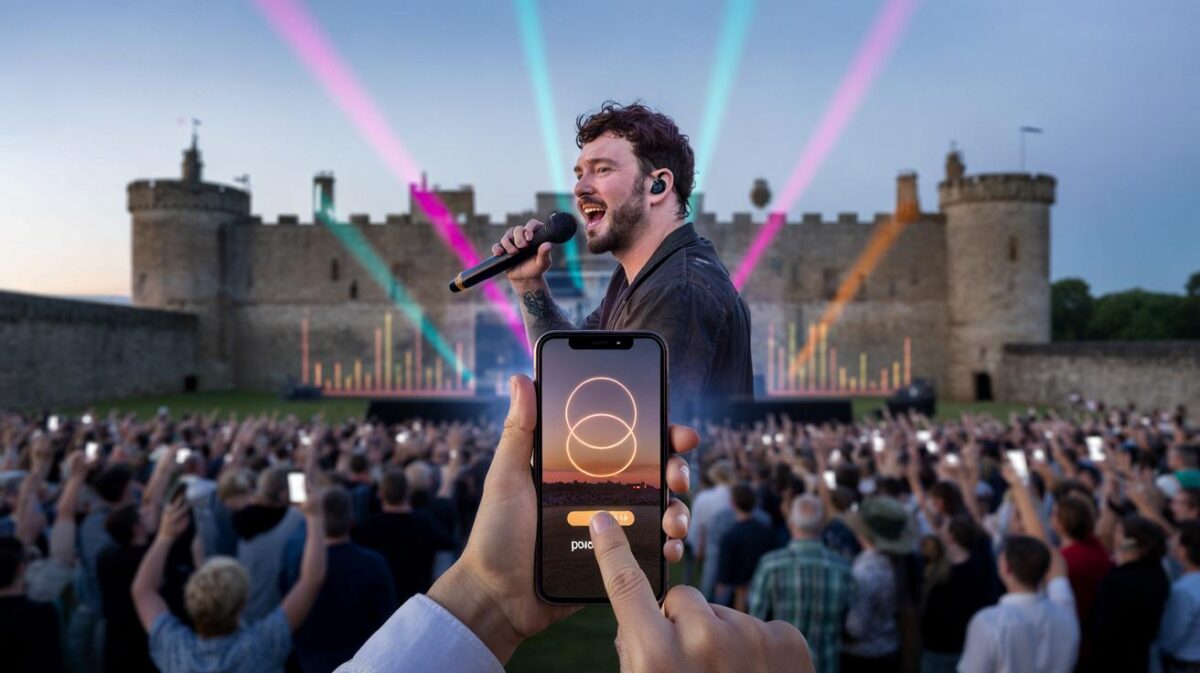You know the dance. Weather, weekends, where-you-from. It keeps things polite, yet you walk away with that thin plastic feeling, like you chewed gum for dinner. Many of us ache for conversations that are warm and alive, the kind you replay on the bus home. There’s a way to get there without being weird or pushy. It starts small.
I nodded, did the rain chat, and almost drifted off. Then he mentioned the long drives to his mum’s, because the hospital rang at night. Something softened. He said it lightly, like a leaf landing. I asked, “How are you holding that?” and watched his shoulders drop a centimetre.
People moved past us towards the cake. Music hiccupped between decades. We talked for twelve minutes that felt like a warm pocket in a cold jacket. He laughed once, properly. We’d never spoken like that in a year of hello-goodbye. The room hummed. I remember thinking: what changed? Just one better question.
I left with the story of a son, not a weather report.
Why small talk feels safe — and why it stalls us
Small talk is social bubble wrap. It protects us from the awkward pop of silence and gives everyone a quick way to signal “I’m friendly, not a threat.” That matters in offices, lifts, and late trains. The trouble is, the wrap never comes off. We end up trading packets of information that don’t add up to a person.
There’s also a pace problem. Our lives move fast enough that neutral topics act like speed bumps, smoothing any risky turns. It’s easier to lob a “Busy week?” than to risk “What’s been on your mind?” So we skate. The surface gleams. Underneath, nothing warms. We leave with names, job titles, and a faint ache for something more nourishing.
Research hints at what our guts already know: people report greater wellbeing when their days include more substantive conversations and less verbal filler. Not dramatic confessions, just richer exchanges. Depth soothes the nervous system because we feel seen rather than scanned. Meaningful talk is like a hand on your back saying, “I’m here.” That’s why we remember it on Tuesday.
From filler to fibre: moves that make conversations matter
Here’s a tiny switch that changes everything: ask about moments, not facts. Facts are static. Moments have a pulse. Try “What’s the story behind that?” when someone mentions a hobby, a mug, or a playlist. Follow with “What surprised you about it?” and let them steer. It’s gentle, curious, and gives people permission to bring themselves, not their CV.
When you feel the door crack open, share a sliver from your side. Not a monologue. A slice. “I started running after my dad got ill. It’s the only thing that quietens my head.” Then pause. You’re not trying to impress; you’re signalling safety. Let’s be honest: nobody does that every day. Still, two sentences of honest context turn a chat into a bridge.
Watch for green lights. Eyes that linger, shoulders lowering, answers expanding by a clause or two. That’s your cue to go one notch deeper with this sequence: “How did that feel?” then “What did it change?” and finally “What’s next for you?” If they pivot away, let it breathe and lighten the load.
“Real conversation isn’t an accident. It’s a choice.”
- Starter prompts that work anywhere: “What are you enjoying lately?”, “What’s been a bright spot this week?”, “What’s the story behind that photo on your desk?”
- Move from topic to meaning: fact → feeling → impact → next step.
- Offer small reveals: two sentences, then a question back.
- Respect exits: if the energy dips, shift to a lighter lane without fuss.
The traps, the tells, and the quiet courage
Curiosity beats interrogation. Keep your questions open, but not endless. Swap “Why did you…” for “What led you…” to soften the edge. Give answers room to land. A beat of silence isn’t failure; it’s where the good stuff ferments. If they gift you a detail, reflect a piece back before moving on. It’s how people feel held.
Two common missteps: hijacking and oversharing. Hijacking is when someone mentions a loss and you sprint into your own epic. Oversharing is dumping your inner attic on a stranger. Both come from nerves. Try this instead: mirror a word they used, add one small piece from your life, and ask a grounded follow-up. **Depth doesn’t mean drama. It means presence.**
Bodies speak first. Feet pointing towards you? They’re in. Glances darting to the door? Time to wind down. If you’re unsure, name your intent lightly: “I’d love to hear more, but we can keep it breezy.” That phrase rescues everyone. We’ve all lived that moment where you crave connection but fear being heavy. **Ask about moments, not facts.** It’s a compass that rarely fails.
We put too much pressure on “big talk,” as if meaning only arrives in candlelight with string quartets. It’s built from small honest bricks. One brick could be “What are you learning the hard way?” over a coffee queue. Another is “Who helped you this month?” during a team stand-up. **Little by little, trust migrates from the edges to the middle.**
Here’s a comfort: not every conversation must go deep. Some are warm-ups, like stretching before a run. Keep a pocketful of soft pivots. “Can I ask a nosy one?” grants consent. “Want the short answer or the long one?” sets boundaries. If they choose short, go short. If they choose long, let the clock soften and follow the thread where it wants to go.
In groups, aim for invitations rather than spotlights. “I’m curious what stood out to people” works better than firing questions at one person. If you fear going blank, use your surroundings as prompts. The venue, the playlist, the food—these are doorways. Turn an object into a story with one sentence: “Who picked this place?” People rarely resist telling a tale they feel part of.
There’s also the bravery of ending well. If the energy dips or the room needs you elsewhere, leave a breadcrumb: “I’ve loved this. Fancy picking it up next week?” Meaningful talk isn’t a one-off stunt. It’s a thread you can return to, stronger for being paused kindly. **Say less, listen closer, return with care.**
One last shift that frees you: you’re not a performance. You’re a person. Speak the way you wish someone would speak to you on a tired Thursday. Paring back polish helps more than adding sparkle. Soyons honnêtes : personne ne fait vraiment ça tous les jours.
What happens when conversations get real
People remember how you made them feel seen. A manager who asks, “What would make your week easier?” gets better work than one who asks, “Busy?” A neighbour who says, “What’s changed since last time?” learns the new chapter, not the old headline. It’s not magic. It’s lazy questions swapped for living ones.
Meaningful talk spills into practical goodness. You find mentors without asking for mentors. You spot opportunities because someone trusted you with their hopes, not their LinkedIn. You stay for one more drink, or leave five minutes earlier, because there’s no performance to keep up. The room becomes kinder. Your day does too.
And you? You get language for your own life as you hear others frame theirs. Values sharpen. Decisions untangle. Even on the days you only manage one small brave question, that’s enough. The world doesn’t need more “What do you do?” loops. It needs more “What’s your story today?” said with a soft grin and genuine time to listen.
| Point clé | Détail | Intérêt pour le lecteur |
|---|---|---|
| Ask about moments, not facts | Use prompts like “What’s the story behind…?” | Unlocks richer answers without feeling intrusive |
| Share a small slice | Two honest sentences, then a question back | Builds trust while avoiding oversharing |
| Follow the feel → change | Sequence: feeling, impact, next step | Gently deepens talk in a safe, natural way |
FAQ :
- How do I pivot from small talk without it feeling abrupt?Bridge with what’s already there: “You mentioned the night shifts—what’s that been like?” One step, not a leap.
- What if the other person doesn’t want to go deeper?Respect the signal. Ease back with a lighter strand and leave a door open: “Happy to keep it breezy.”
- Is this appropriate at work?Yes, within bounds. Focus on process and experience: “What made that project tricky?” rather than personal history.
- How do I avoid oversharing?Share two sentences, check in, then ask a question. If you feel a “vulnerability hangover,” you went too far, too fast.
- What are some go-to openers?“What’s been a bright spot this week?”, “What are you learning lately?”, “What’s the story behind that?”—all low risk, high yield.









Loved the ‘ask about moments, not facts’ switch — it instantly made a coffee chat feel like a real exchange today. I tried “What’s the story behind that mug?” and my coworker told me about her grandmother in under two minutes. Wild how a small question can change the whole vibe. Any tips for when someone gives one-word answers even after a warmer prompt? I tend to panic and over-talk, which defintely breaks the spell.